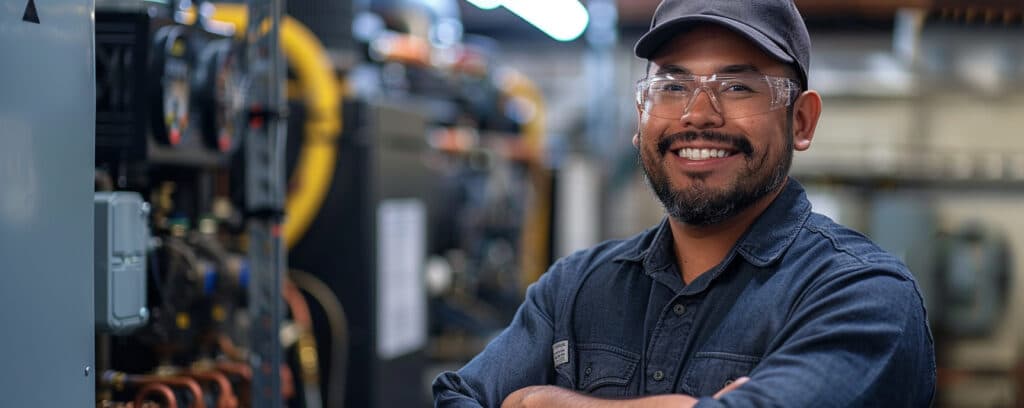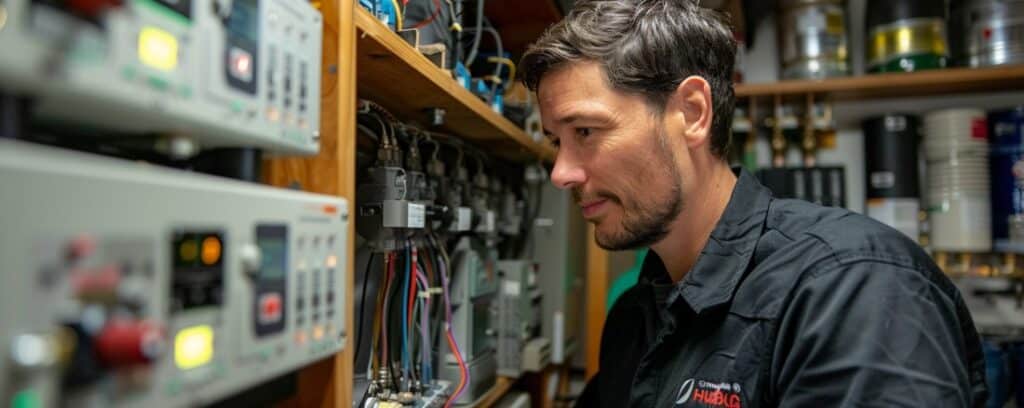- Understanding the Role of an HVAC Engineer
- Step-by-Step Guide to Becoming an HVAC Engineer
- Overview of Typical Curriculum in HVAC Engineering Programs
- Job Roles and Settings Available to HVAC Engineers
- Job Outlook and Salary for HVAC Engineers
- Frequently Asked Questions
- Charting Your Path to a Successful HVAC Engineering Career
HVAC engineering is a critical field that plays a vital role in modern building systems. HVAC engineers are responsible for designing, installing, and maintaining heating, ventilation, and air conditioning systems that ensure the comfort and safety of building occupants. As buildings become more energy-efficient and environmentally friendly, the demand for skilled HVAC engineers continues to grow.
This article will guide you through the steps to becoming an HVAC engineer, including the necessary education, certifications, and career opportunities. Whether you are an aspiring student or a current professional looking to advance your career, understanding the pathway to HVAC engineering is essential.
Understanding the Role of an HVAC Engineer
An HVAC engineer is a professional who specializes in the design, installation, and maintenance of heating, ventilation, and air conditioning systems. These systems are crucial for ensuring indoor air quality and maintaining comfortable temperatures in residential, commercial, and industrial buildings. HVAC engineers play a pivotal role in creating energy-efficient and sustainable environments.
The primary responsibilities of an HVAC engineer include:
- Designing HVAC Systems: Developing plans and specifications for new HVAC installations or upgrades to existing systems. This involves calculating heating and cooling loads, selecting appropriate equipment, and ensuring compliance with building codes and standards.
- Installing HVAC Systems: Overseeing the installation of HVAC systems, ensuring that all components are correctly installed and integrated. This may involve coordinating with other construction professionals such as architects and electricians.
- Maintaining and Repairing Systems: Performing regular maintenance and repairs to keep HVAC systems operating efficiently. This includes troubleshooting issues, replacing faulty components, and conducting performance tests.
- Energy Management: Implementing strategies to improve the energy efficiency of HVAC systems. This can involve upgrading equipment, optimizing system controls, and recommending energy-saving practices to building owners.
- Compliance and Safety: Ensuring that HVAC systems comply with all relevant safety and environmental regulations. This includes handling refrigerants safely and following protocols for indoor air quality.
Types of HVAC Engineers
HVAC engineers can specialize in various areas, depending on their interests and career goals. Some common specializations include:
- Residential HVAC Engineer: Focuses on designing and maintaining HVAC systems for homes and apartments. Residential engineers often work directly with homeowners to install and service systems that meet their specific needs.
- Commercial HVAC Engineer: Works on larger HVAC systems for commercial buildings such as offices, schools, and hospitals. Commercial engineers must consider the unique requirements of these environments, including higher occupancy levels and diverse usage patterns.
- Industrial HVAC Engineer: Specializes in HVAC systems for industrial facilities like factories and warehouses. These engineers deal with complex systems that must maintain precise temperature and humidity levels to support manufacturing processes.
- Sustainability Consultant: An HVAC engineer who focuses on making buildings more energy-efficient and environmentally friendly. This role involves performing energy audits, recommending green technologies, and helping buildings achieve certifications such as LEED (Leadership in Energy and Environmental Design).
Understanding the diverse roles and responsibilities within HVAC engineering can help you decide which path best aligns with your interests and career aspirations. As the demand for energy-efficient and sustainable building solutions grows, HVAC engineers will continue to play a crucial role in shaping our built environment.
Step-by-Step Guide to Becoming an HVAC Engineer
Becoming an HVAC engineer typically starts with a strong educational foundation in science, technology, engineering, and mathematics (STEM). Here’s a step-by-step guide on the educational pathways to pursue a career in HVAC engineering:
High School Preparation
High school students interested in HVAC engineering should focus on STEM subjects. Courses in mathematics, physics, chemistry, and computer science provide essential knowledge that will be built upon in college. Participating in extracurricular activities such as science clubs or engineering competitions can also be beneficial.
Pursuing an HVAC Engineering Degree
The most common pathway to earning an “HVAC engineering degree” is to pursue a mechanical engineering degree from an accredited institution. Here’s a breakdown of the typical educational journey:
- Mechanical Engineering Degree: Most HVAC engineers start with a mechanical engineering degree, which typically takes four years to complete. This program covers essential principles such as thermodynamics, fluid mechanics, and heat transfer, providing a strong foundation for a career in HVAC.
- Specialization in HVAC: During their mechanical engineering studies, students can specialize in HVAC through elective courses, internships, and projects focused on HVAC systems. Some universities may offer specific tracks or concentrations in HVAC within their mechanical engineering programs.
- Master’s Degree: For those looking to further specialize, a master’s degree in mechanical engineering or a related field can be beneficial. These programs often offer advanced courses in HVAC system design, energy management, and building automation, and typically take an additional two years after the bachelor’s degree.
- Certifications and Licensing: Obtaining professional certifications such as those offered by ASHRAE or NATE can enhance an HVAC engineer’s qualifications. Certifications like the Professional Engineer (PE) license are also valuable for career advancement.
- Continuing Education: HVAC professionals often engage in continuous learning through workshops, seminars, and online courses to stay updated with the latest technologies and industry standards.
It is crucial to choose a program accredited by the Accreditation Board for Engineering and Technology (ABET), as this ensures the education meets industry standards and is recognized by employers.
Gaining Practical Experience
Practical experience is essential for HVAC engineers. Here are some ways to gain hands-on experience:
Internships and Co-Op Programs
Many engineering programs offer internships or cooperative education (co-op) programs that allow students to work in the HVAC industry while completing their degrees. These opportunities provide valuable real-world experience, help build professional networks, and can sometimes lead to job offers upon graduation.
Entry-Level Positions
After completing their education, aspiring HVAC engineers can start in entry-level positions such as HVAC technician or junior engineer. These roles provide practical experience and a deeper understanding of HVAC systems, which is essential for career advancement.
Certification and Licensing
To enhance career prospects and credibility, HVAC engineers should obtain relevant certifications and licenses:
Professional Engineer (PE) License
Earning a Professional Engineer (PE) license is a significant milestone for HVAC engineers. The process typically involves:
- Education: Completing an accredited engineering degree.
- Fundamentals of Engineering (FE) Exam: Passing this exam is the first step towards becoming a PE.
- Work Experience: Gaining four years of relevant work experience under the supervision of a licensed PE.
- Principles and Practice of Engineering (PE) Exam: Passing this comprehensive exam in the HVAC discipline.
Additional Certifications
Other valuable certifications for HVAC engineers include:
- LEED Certification: Offered by the U.S. Green Building Council, this certification focuses on sustainable building practices.
- ASHRAE Certification: The American Society of Heating, Refrigerating, and Air-Conditioning Engineers offers various certifications that validate expertise in specific HVAC areas.
- NATE Certification: The North American Technician Excellence certification is widely recognized in the HVAC industry and demonstrates proficiency in installation and service.
By following these educational and certification pathways, aspiring HVAC engineers can build a solid foundation for a successful career in this dynamic and essential field.
Overview of Typical Curriculum in HVAC Engineering Programs
When pursuing an HVAC engineering degree, students engage in a rigorous curriculum designed to provide a comprehensive understanding of heating, ventilation, and air conditioning systems. This section outlines the core subjects and training that are typically part of HVAC engineering programs.
Core Subjects and Training
Thermodynamics and Fluid Mechanics
Thermodynamics and fluid mechanics are foundational subjects in HVAC engineering. These courses cover the principles of energy transfer, heat exchange, and fluid flow, which are crucial for designing efficient HVAC systems. Students learn about the laws of thermodynamics, heat engines, refrigeration cycles, and the behavior of fluids in various conditions. Mastery of these concepts is essential for developing systems that effectively manage temperature and air quality.
HVAC System Design
Courses in HVAC system design focus on the practical aspects of creating heating, cooling, and ventilation solutions. Students learn to calculate heating and cooling loads, select appropriate equipment, and design ductwork and piping systems. The curriculum often includes software training for tools such as AutoCAD and Revit, which are used to create detailed system layouts. Understanding building codes and standards, such as those set by ASHRAE (American Society of Heating, Refrigerating, and Air-Conditioning Engineers), is also a key component of this training.
Controls and Automation
With the growing emphasis on smart buildings and energy efficiency, courses on controls and automation are becoming increasingly important in HVAC engineering programs. These courses teach students how to design and implement control systems that regulate HVAC operations. Topics include sensors and actuators, control algorithms, and building management systems (BMS). Students learn how to use control systems to optimize energy use and maintain comfortable indoor environments.
Energy Management
Energy management courses are critical for HVAC engineers who aim to design systems that minimize energy consumption and reduce environmental impact. Students study energy auditing, sustainable design practices, and the integration of renewable energy sources. They learn to analyze energy usage patterns and recommend improvements to enhance efficiency. Courses may also cover green building certifications, such as LEED, and the role of HVAC systems in achieving these standards.
Hands-On Training and Laboratory Work
In addition to theoretical knowledge, HVAC engineering programs emphasize hands-on training. Laboratory courses allow students to apply what they have learned in real-world scenarios. They work with HVAC equipment, conduct experiments, and perform system diagnostics. This practical experience is crucial for developing the skills needed to design, install, and maintain HVAC systems effectively.
Capstone Projects and Internships
Many HVAC engineering programs include a capstone project or internship as part of the curriculum. These experiences provide students with the opportunity to work on real projects, often in collaboration with industry partners. Capstone projects typically involve designing a complete HVAC system for a building, from initial concept to detailed plans. Internships offer on-the-job training, allowing students to gain practical experience and build professional networks.
By completing a comprehensive curriculum that includes these core subjects and practical experiences, students are well-prepared for careers in HVAC engineering. They gain the knowledge and skills needed to design efficient, sustainable HVAC systems that meet the demands of modern buildings.
Job Roles and Settings Available to HVAC Engineers
A degree in HVAC engineering opens up a wide range of career opportunities across various sectors. HVAC engineers are in demand in residential, commercial, and industrial settings, each offering unique challenges and rewards. Here’s an overview of the different job roles and environments available to HVAC engineers.
Career Opportunities for HVAC Engineers
Residential HVAC Engineer
Residential HVAC engineers specialize in designing, installing, and maintaining heating, ventilation, and air conditioning systems in homes and apartment buildings. Their work involves creating systems that provide efficient and reliable climate control while meeting the specific needs of homeowners. Residential HVAC engineers must be adept at working directly with clients, assessing their needs, and ensuring customer satisfaction. This role often includes tasks such as performing energy audits, recommending system upgrades, and ensuring compliance with local building codes.
Commercial HVAC Engineer
Commercial HVAC engineers focus on larger and more complex HVAC systems used in commercial buildings such as office buildings, schools, hospitals, and retail centers. These systems must accommodate larger spaces and higher occupancy levels, which requires more advanced design and engineering skills. Commercial HVAC engineers are responsible for ensuring that these systems provide optimal indoor air quality and energy efficiency. They often work as part of a multidisciplinary team, collaborating with architects, electrical engineers, and construction managers to design and implement HVAC solutions.
Industrial HVAC Engineer
Industrial HVAC engineers work in settings such as factories, warehouses, and manufacturing plants. These environments often have unique requirements, such as maintaining precise temperature and humidity levels to support production processes. Industrial HVAC engineers must design robust systems that can handle large-scale operations and withstand harsh conditions. They may also be involved in developing HVAC solutions for specialized applications, such as clean rooms in pharmaceutical manufacturing or controlled environments in data centers.
Specialized Roles
In addition to general HVAC engineering roles, there are opportunities to specialize in specific areas of the field:
- Refrigeration Specialist: Focuses on the design and maintenance of refrigeration systems, which are essential for industries like food storage and pharmaceuticals.
- Energy Management Consultant: Works on optimizing HVAC systems to improve energy efficiency and reduce operational costs. This role often involves conducting energy audits and recommending upgrades.
- Sustainability Consultant: Helps buildings achieve sustainability certifications such as LEED by designing HVAC systems that meet stringent environmental standards.
- HVAC System Designer: Specializes in creating detailed plans and specifications for HVAC systems, often using advanced software tools like AutoCAD and Revit.
Work Environments
HVAC engineers can find employment in a variety of settings, including:
- Engineering Firms: Many HVAC engineers work for consulting firms that provide design and engineering services to a wide range of clients.
- Construction Companies: HVAC engineers often collaborate with construction companies to design and install systems in new buildings and renovation projects.
- Manufacturing Companies: Some HVAC engineers are employed by manufacturers of HVAC equipment, where they work on product design, development, and testing.
- Government Agencies: Public sector roles can include working for municipal or state governments on large public works projects, ensuring that HVAC systems in public buildings are efficient and up to code.
- Educational Institutions: Universities and technical schools may hire HVAC engineers as instructors to teach the next generation of engineers.
Career Advancement
HVAC engineers have numerous opportunities for career advancement. With experience, they can move into senior engineering roles, project management, or executive positions within their organizations. Continuing education and obtaining advanced certifications can further enhance career prospects and open doors to specialized roles or leadership positions.
Job Outlook and Salary for HVAC Engineers
The HVAC engineering field is experiencing steady growth, driven by increasing demand for energy-efficient and sustainable building solutions. According to the U.S. Bureau of Labor Statistics (BLS), employment of mechanical engineers, which includes HVAC engineers, is projected to grow 10% from 2022 to 2032 , much faster than the average for all occupations.
Salary Expectations
Salaries for HVAC engineers can vary widely based on factors such as experience, education, location, and industry. As of May 2023, the median annual wage for mechanical engineers, including HVAC engineers, was $99,510, according to the BLS. Entry-level engineers can expect to earn between $60,000 and $70,000 per year, while those with more experience and advanced certifications can earn significantly higher HVAC engineer salaries. Here are some factors that influence HVAC engineering salaries:
- Experience: Engineers with more years of experience typically earn higher salaries due to their advanced skills and proven track record.
- Certifications: Obtaining certifications such as the Professional Engineer (PE) license or LEED accreditation can lead to higher pay and better job opportunities.
- Location: Geographic location plays a significant role in salary variations. For example, HVAC engineers in metropolitan areas or regions with a high demand for their skills, such as California and New York, tend to earn higher wages.
- Industry: HVAC engineers working in specialized industries, such as manufacturing, research and development, or consulting, may earn higher salaries compared to those in residential or commercial sectors.
Future Trends
The HVAC industry is evolving with advancements in technology, such as smart HVAC systems, renewable energy integration, and improved building automation. Staying current with these trends through continuous education and professional development is crucial for HVAC engineers looking to advance their careers and maximize their earning potential.
Frequently Asked Questions
How long does it take to become an HVAC engineer?
The time it takes to become an HVAC engineer can vary depending on the educational and career path chosen. Here’s a general timeline:
- High School: Completing high school with a focus on STEM subjects typically takes four years.
- Associate Degree: An associate degree in HVAC technology or a related field usually takes two years to complete.
- Bachelor’s Degree: A bachelor’s degree in mechanical engineering or HVAC engineering typically takes four years.
- Master’s Degree (optional): For those seeking advanced knowledge or specialized roles, a master’s degree may take an additional two years.
- Internships/Co-ops: Gaining practical experience through internships or co-op programs can be done concurrently with degree programs but generally adds about one to two years of part-time work.
- Licensing and Certification: Obtaining a Professional Engineer (PE) license requires four years of work experience and passing the necessary exams. Additional certifications can be obtained during or after this period.
In total, the path to becoming a fully licensed HVAC engineer can take between eight to ten years, depending on the level of education pursued and the time taken to gain practical experience.
Are there online HVAC engineering programs available?
Yes, there are online HVAC engineering programs available for those who need flexibility due to work or personal commitments. Many universities and technical schools offer online courses and degree programs in HVAC engineering and related fields. These programs typically include a combination of online coursework and hands-on lab experiences that can be completed locally. While online programs provide convenience, it’s important to ensure that the program is accredited and offers the necessary practical training required for the field.
What skills are essential for an HVAC engineer?
HVAC engineers need a diverse set of skills to succeed in their roles. Some of the essential skills include:
- Technical Skills: Proficiency in HVAC system design, thermodynamics, fluid mechanics, and electrical systems.
- Analytical Skills: Ability to analyze complex problems, perform calculations, and develop efficient solutions.
- Computer Skills: Familiarity with design and simulation software such as AutoCAD, Revit, and energy modeling tools.
- Problem-Solving Skills: Capacity to troubleshoot and resolve issues with HVAC systems effectively.
- Communication Skills: Ability to communicate technical information clearly to clients, colleagues, and contractors.
- Project Management Skills: Competence in managing projects, including budgeting, scheduling, and coordinating with other professionals.
- Attention to Detail: Precision in designing systems and ensuring compliance with safety and regulatory standards.
Can HVAC engineers work internationally?
Yes, HVAC engineers can work internationally. The demand for skilled HVAC engineers is global, with opportunities available in many countries. Engineers may find work with multinational companies, international engineering firms, or by obtaining contracts for projects abroad. However, it’s important to be aware of and comply with the specific licensing and certification requirements in different countries. Additionally, learning about local building codes, standards, and regulations is crucial for international work.
Charting Your Path to a Successful HVAC Engineering Career
Embarking on a career as an HVAC engineer offers numerous opportunities for professional growth, job security, and financial stability. Understanding the steps to becoming an HVAC engineer and the potential career paths can help you make informed decisions about your future.
Investing in HVAC engineering education and training is a step toward a stable and rewarding career. By understanding the necessary educational pathways, gaining practical experience, obtaining relevant certifications, and exploring diverse career opportunities, you can set yourself up for success in this dynamic field. The HVAC industry continues to evolve, offering numerous opportunities for growth and advancement for those willing to stay current with industry trends and advancements.




